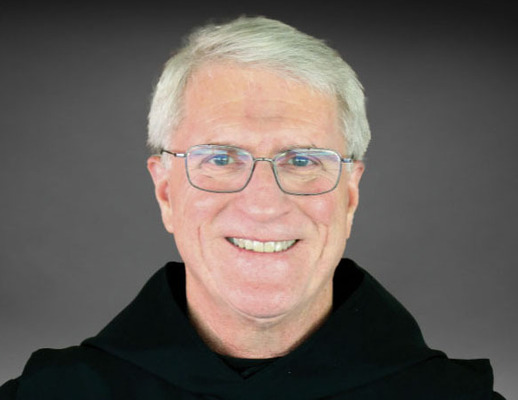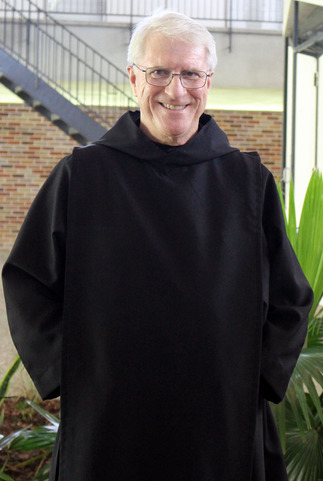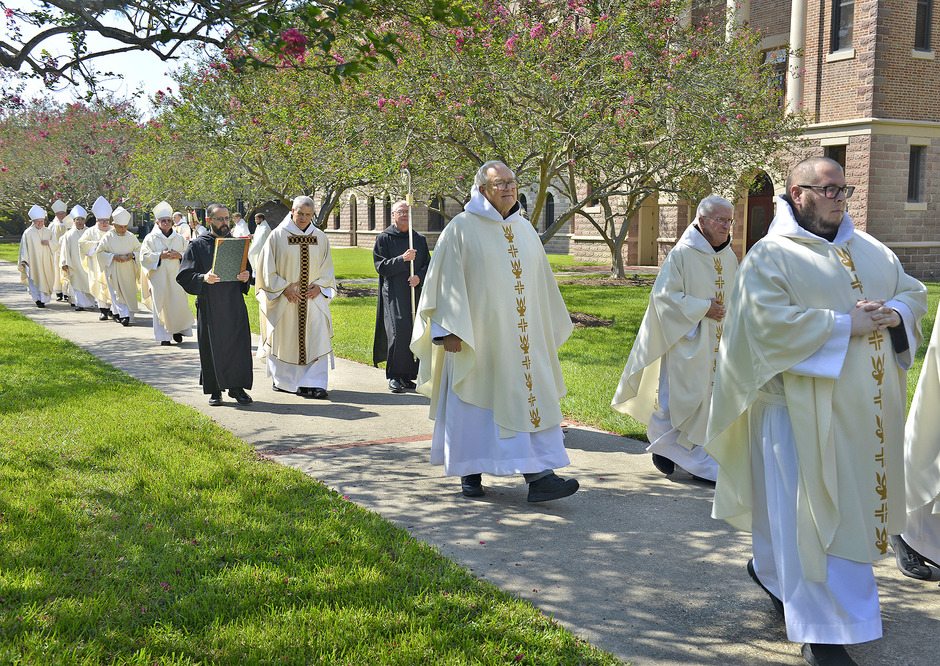
A platform that encourages healthy conversation, spiritual support, growth and fellowship

NOLACatholic Parenting Podcast
A natural progression of our weekly column in the Clarion Herald and blog

The best in Catholic news and inspiration - wherever you are!
St. Ben’s new rector-president at home at his northshore alma mater
-

Above: Benedictine Father Matthew Clark, the newly appointed rector-president of St. Joseph College Seminary in St. Benedict, Louisiana, has spent most of his priestly ministry at the seminary affectionately known as “St. Ben’s.” He is also a proud alumnus. (Photos courtesy of St. Joseph Seminary College)
Wartime service
By BETH DONZE
Clarion Herald
Benedictine Father Matthew Clark has been appointed rector-president of St. Joseph Seminary College, his alma mater and the residential campus of 93 undergraduate-level seminarians who are exploring a potential vocation to the priesthood on the grounds of St. Joseph Abbey in St. Benedict, Louisiana.
Father Matthew had been serving as St. Joseph’s acting president-rector since last summer, when his predecessor, Benedictine Father Gregory Boquet, assumed his current role as abbot of St. Joseph Abbey.
Father Matthew, a member of the philosophy faculty, had previously served as vice rector for 18 years at St. Joseph Seminary College, an institution affectionately known as “St. Ben’s.”
“I have worked there for most of my adult career – I’ve seen it grow, I’ve seen it change and I worked with Abbot Gregory for most of the years of his time as rector-president – so I feel very well-prepared,” said Father Matthew, of his appointment, announced March 14 following an unanimous vote of support from the college’s board of trustees.
“I know most of the ins and outs of the seminary community and the functions of the seminary college, so I feel confident,” he said. New Orleans born and raised
New Orleans born and raised
Father Matthew, 66, grew up in Resurrection of Our Lord Parish and School in New Orleans East, inspired by the priestly example of Msgr. Francis Boeshans, his late pastor. As the teenage Father Matthew neared his 1976 graduation from Jesuit High School, he felt a strong calling to the priesthood, but after speaking with the Jesuits’ vocations director, he realized the Jesuits were not for him.
“I wanted to stay in New Orleans – in Louisiana – and the Jesuits travel around the world,” said Father Matthew, who enrolled at Benedictine-operated St. Ben’s and continued his priestly preparation at Notre Dame Seminary.
During graduate studies at Notre Dame, he discerned a “very powerful calling to the monastic life” – and to Benedictine monasticism, in particular – leading him and six of his classmates to split their time between attending classes in New Orleans during the week, and spending weekends living in community with the monks of St. Joseph Abbey.
“I came to really fall in love with the place,” he recalled. “Once I left (St. Ben’s to attend Notre Dame Seminary), I began to feel that draw back, not only to the place itself but to the monastic life, the prayer, the Mass here, to community life itself. Even though I was a city mouse who still loved New Orleans, I fell in love with the abbey, with the grounds, with the forest, with everything here!”
Father Matthew made his solemn vows as a Benedictine in 1986 and was ordained a priest the following year by Archbishop Philip Hannan.Although his main roles have been as a St. Ben’s educator and administrator, Father Matthew’s nearly four decades of priestly ministry include 10 years as a U.S. Naval Reserve chaplain. That tenure was marked by a six-month deployment to Camp Fox – the Marine Corps’ logistics command center in Kuwait – as a Catholic chaplain during Operation Iraqi Freedom in 2003. Part of his wartime ministry involved being driven through the desert in search of Iraq War service men and women who desired Mass and the sacraments.
“When you’re in a combat zone, you have periods of great intensity and then long periods of boredom,” Father Matthew observed. “It was a wonderful time – to be able to find a unit that was in the field and then minister to them. That absolutely affirmed my priesthood, and, in some ways, (affirmed) my monastic life, too – that deep appreciation for the power of community life as I extended ‘community’ to these Marines and sailors out there in the middle of nowhere; being their connection to their faith, their connection to civilization, in a sense.”
Blending the ‘four pillars’
Fresh look at formational needs
As both acting and now permanent rector-president of St. Ben’s, Father Matthew has been immersed in his seminary’s inaugural year of implementation of the Sixth Edition of the Program for Priestly Formation – known by the shorthand of “PPF 6” – the USCCB’s latest guidelines for priestly formation in all seminaries in the U.S.
“They’ve re-envisioned priestly formation for our times – according to the vision of Pope Francis and the leaders in Rome who deal with priestly formation – in response to the many questions our young people are asking now, which are quite different from when I was a seminarian many years ago,” Father Matthew said.
For example, PPF 6 addresses the relationship between seminarians and technology, encouraging seminaries to cultivate it as a “tool” to assist the future priests in their various ministries, rather than as “the center point” of their lives, Father Matthew said.
“We want them to develop a self-mastery in their relationship with technology and the Internet, and to use them well – for the proclamation of the Gospel, and not simply for mindless scrolling,” he said.Another PPF 6-recommended shift is to better integrate the “four pillars” of priestly formation, which the previous Program of Priestly Formation (PPF 5) defined as “human,” “spiritual,” “intellectual” and “pastoral” formation.
“PPF 6 also talks about these areas of formation, but it has dropped the word ‘pillar’ – because these are not areas of formation that (are to be) siloed,” Father Matthew said, noting that the tendency of seminaries to treat the four pillars as stand-alones sometimes produced priests who assumed they could specialize – for example, be a “spiritual priest” who prayed all the time and put his intellectual formation on the backburner; or be a priest who was “all about the academics,” to the detriment of cultivating his pastoral dimension.
“We’re trying to help the men develop and grow in a very integrated way, so that when they come into seminary, academics is important and remains important here at St. Ben’s – we have a wonderful faculty and a rigorous academic program to prepare them for their study of graduate theology – but academics is not the one, dominant thing in seminary formation.
“The vision is to have intellectual formation as an important part of a bigger whole, which includes the spiritual; the human – their development in Christian maturity and in the virtues; and the pastoral, which is where it’s all leading to – for the priest to be that pastor who leads the church in prayer, preaches and guides a parish.”
PPF 6 has “a lot to say about pastoral charity,” added Father Matthew, offering a few ways St. Ben’s exposes its students to this element of priestly formation: First-year seminarians make service trips to New Orleans and Baton Rouge to assist the poor and homeless, and learn about the needs of immigrants at the border during an annual trip to the Diocese of El Paso; second- and third-year seminarians visit nursing homes, teach at northshore-area Parish Schools of Religion and assist a Catholic street ministry in Covington; and seniors have a mission immersion experience in Esquipulas, Guatemala, the location of a thriving Benedictine monastery whose community serves the local population in ways that include teaching ESL at a local school.
“(Service work) is more than just a nice experience to get your feet wet,” Father Matthew said. “PPF 6 sees pastoral service to the poor as an integral part of their introduction to their lifelong ministry as a priest.”
Pictured below: Benedictine Father Matthew Clark (second from right) processes into St. Joseph Abbey Church to attend the Sept. 17, 2023, abbatial blessing of Abbot Gregory Boquet, his predecessor. (Clarion Herald file photo by Frank J. Methe)
Seminarians from seven states
With the first year of PPF 6 implementation wrapping up soon, Father Matthew said he and his staff will begin working on a new strategic plan for St. Ben’s in April. The college’s course of training fulfills the requirements of ecclesiastical norms and offers a major in philosophy and the liberal arts or in philosophy and theological studies. Its faculty of 25, assisted by four instructors emeriti, oversee three academic divisions: Language, Literature and Fine Arts; Philosophy and Theological Studies; and Social, Natural and Behavioral Sciences.
St. Ben’s 93 resident seminarians hail from Louisiana, Mississippi, Alabama, Georgia, Texas, Florida and Tennessee. In a tradition that stretches back to 1975, it is also home to Vietnamese seminarians from two congregations who ultimately will serve as priests in Baton Rouge and New Orleans.
“As of next year we will add South Carolina – Charleston has announced that it will be sending us their seminarians,” Father Matthew said.
As always, one of the college’s greatest assets is the “powerful influence” of the Benedictine monastic tradition practiced by the abbey’s 30 monks, Father Matthew notes. Although there is a clear division between the seminary campus and the private monastic community, the two entities share use of the abbey church, worship together on Sundays and have full run of their home’s 1,200 acres of pine forest for hiking, running and recreational pursuits on the Bogue Falaya River.
Father Matthew, who also plays the organ at the abbey church, said confirmation that St. Ben’s is on the right track hit home recently when the president-rector and a faculty member from St. Vincent de Paul Regional Seminary in Boynton Beach, Florida, visited campus.
“They already have a dozen or more of our graduates, and they are so impressed with what we’re doing that they wanted to visit,” he said. “That (speaks to) the longtime legacy of Abbot Gregory, and I’m continuing that legacy – that tradition of doing the best we can to form these young men and to prepare them for graduate theology. We’re doing the best we can, and we want to keep on doing it better!”
[email protected]





